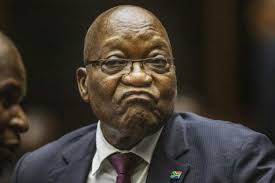
FOR many years Jacob Zuma, faced by allegations of corruption around the arms deal of the late 1990s and his later association with the Gupta family, demanded his day in court. Yet this was a hollow gesture: using either tainted or taxpayers’ money, he sought every possible delaying tactic. A motley array of allies that shifted in composition over time spoke aggressively on his behalf or claimed they were prepared to die for him. (Quite how this might be necessary was never made clear, but all is grist to the mill of populist nationalist rhetoric.) Zuma himself was fond of dancing on a stage singing about machine guns while supporters waved wooden replicas.
Those days are long gone. The net has been drawn tighter and legal escape routes plugged by court decisions. Zuma is older and less agile, weakened perhaps by the attempt by one of his numerous wives to poison him. (That was finally confirmed in Russia where they know a thing or two about this type of thing.) And then came the Zondo Commission of Inquiry into State Capture, ironically established by Zuma himself. Witness after witness fingered Zuma in various forms of corrupt activity. Some of them compromised state security and thus breached his oath of office as president.
Zuma has appeared before the commission, but last year decided he would take no further part and literally walked out of a scheduled session. This year the Constitutional Court has ruled that like any other citizen Zuma is obliged to appear when called and answer questions unless he can show that they might incriminate him. He now says he will defy the highest court in the land.
The machine gun rhetoric has given way to raw victimhood, a finely tuned craft in South Africa. At his first appearance before Raymond Zondo, Zuma spun a bizarre tale of conspiracy directed at him and accused various ANC officials of being foreign agents. Paranoia continues to reign coupled with customary aggression towards any person or process that calls into question ANC hegemony. We have reached the crux of the crisis with ANC secretary-general Ace Magashule stating quite blatantly that Zuma can do what he wishes and that we should not be worrying about the Constitution. Now we know exactly what ‘ruling party’ means.
It is ANC practice when cornered to pick out historical events by way of self-justification. Most of these attempts are dishonest, but the latest plumbs the depths. Zuma has compared the recent ConCourt ruling with the notorious Sobukwe clause of 1963. Mentioning Robert Sobukwe and Zuma in the same sentence is outrageous; akin to political blasphemy. The day after Sobukwe’s funeral in 1978, the Natal Witness described him as a man of ‘distinction, vision, moderation and courage’. These are not adjectives that apply by any stretch of the imagination to Zuma.
The South African government saw Sobukwe as so formidable an opponent that at the end of his three-year sentence for incitement it included an infamous clause in the General Law Amendment Act of 1963. This allowed for annually renewable banishment to Robben Island on the grounds that Sobukwe, a stern anti-communist, might commit a crime in terms of the Suppression of Communism Act. After six years, he was placed under house arrest at Galeshewe, Kimberley where he died in 1978 of lung cancer aged only 53.
The apartheid state was terrified of original thinkers and simply murdered two of them, Steve Biko and Richard Turner. Sobukwe they locked up in permanent detention. His was an unusual and powerful combination: a self-effacing intellectual with charismatic leadership qualities. His resolve in setting out on the morning of 21 March 1960 to lead a crowd of 200 people demanding arrest at Orlando police station for refusing to carry their passbooks was extraordinary and testament to his belief in non-violence. It was a day that changed South African history irreversibly and his biographer Benjamin Pogrund, in an obituary for the Rand Daily Mail, described Sobukwe as father of the nation. He symbolised an era when those who occupied leadership roles were, by and large, principled, dedicated and altruistic.
To compare the treatment of Sobukwe with the ConCourt ruling against Zuma requires a superhuman suspension of logic. The presumed inference is that just as Sobukwe was the only person ever subject to his eponymous banishment provision, so Zuma has been singled out for special victimisation. This is ludicrous: Zuma is simply being treated under the law of the land in a democratic dispensation like any other South African, so the comparison is utterly devoid of merit. It is also insulting: Sobukwe was a man of integrity; whereas there is plenty of evidence that Zuma is a venal crook who has inflicted irreparable damage on South Africa.
The net is closing in on some of the more brazen functionaries of the corrupt ANC. It remains a moot point whether any significant figures will ever end up in jail where they belong. But under these circumstances the Constitution, democracy and the rule of law clearly mean nothing to some people who occupy high positions in the land. Thus far the democratic state holds the initiative. But, if fails to deal with a defiant Zuma there will be a crisis with both constitutional and political dimensions.
If ANC members can manipulate history to suit their cause they will have no hesitation in doing so. It’s become second nature.